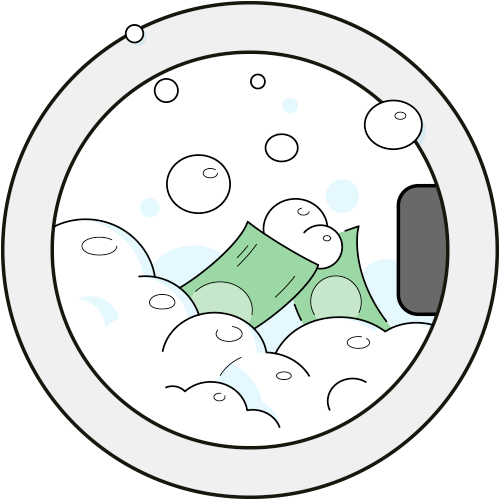How illegal assets are given a legal appearance, and what we can do to prevent this.
Money laundering – what is that?
Money is said to have been laundered when dirty money acquired by illegal means is pumped into the clean financial and economic system. In this way illegal assets are changed into legal ones. Illegal, i.e. dirty money, may originate from many sources: for example from drug dealing, tax evasion, illegal arms dealing, online fraud, child pornography or human trafficking. Terrorism is also predominantly financed by means of money laundering.

How is money laundered?
There are various different ways to launder money. Dummy companies are often set up for this purpose. They issue invoices for services that were never provided or disclose high revenues that were never actually earned. Sometimes the money acquired by illegal means is also spent on expensive purchases, which are then immediately exchanged for cash.
You can also be affected – be on your guard!
Professional money launderers hire financial agents under false pretences, in order to transfer money of a criminal origin through their bank accounts, and thereby to launder it. Such financial agents are also referred to as “money mules” in money laundering jargon, (i.e. donkeys used to transport money). You make yourself liable to prosecution as a recruited financial agent. The offence carries severe custodial sentences or fines.
How does Austria as a financial centre remain
clean?
There are strict rules in Austria for the prevention of money laundering. In particular, banks, insurance companies, investment firms, lawyers and notaries are required to closely observe their customers’ activities closely for possible indications of money laundering. The customer’s identity needs to be determined, checked and documented prior to establishing every business relationship, and constantly updated during the business relationship. Where a suspicion of money laundering is substantiated, then the conspicuities are required to be reported to Criminal Intelligence Service Austria’s Financial Intelligence Unit (Geldwäschemeldestelle) – for example if a customer makes very high payments in cash.
How can you contribute towards the fight against money laundering?
Your bank or another financial service provider copies your identification document and asks for some very personal information. This strict procedure is necessary to be able to detect suspicious behaviour in a timely manner, and therefore to effectively prevent money laundering. The
transparency of the the flows of money is the key in the battle against money laundering and terrorist financing.
Original
The term “money laundering” can be traced back to the notorious American gangster of the 1930s, Al Capone. He invested money obtained from alcohol smuggling and drug dealing in a large number of launderettes and by doing so literally “laundered” his “dirty” money as the profits of a legitimate activity.
Damage to the Real Economy
According to the European Commission, within the EU alone, illegal financial activities like money laundering account for around EUR 160 billion per year.
Frequently asked questions to the FMA’s Consumer Information team:
Which identification document can be used?
It must be an official photo identification document that was issued by a government authority. The identification document must contain a portrait photo that cannot be exchanged for another one, your name, your date of birth, your signature as well as the name of the issuing authority. For example: a passport, driving licence, personal ID card, doctor’s ID card …
Is an identification document that has already expired still valid?
Yes, provided that there have not been any changes in your identification information, and where it is recognisable that it is your signature, and that you are the person shown in the portrait photo.
What questions is my financial services provider allowed to ask?
Financial services providers must know their customers well enough that they recognise unusual transactions. They therefore have to gather sufficient information about customers and about their business relationships.
Further information:
A to Z of Finance
- You can find important basic information on our website: A to Z of Finance – Investments